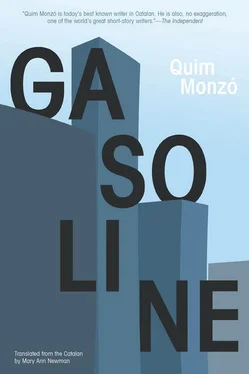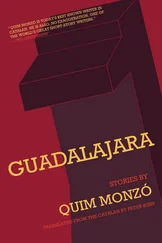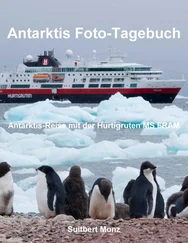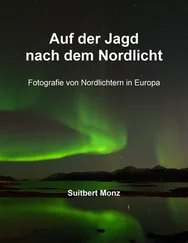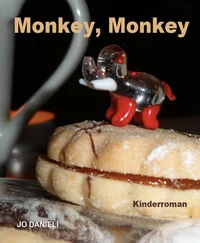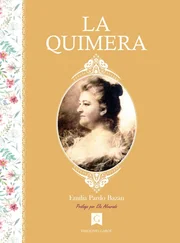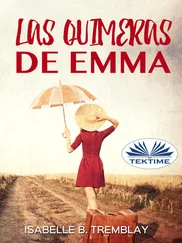Quim Monzó - Gasoline
Здесь есть возможность читать онлайн «Quim Monzó - Gasoline» весь текст электронной книги совершенно бесплатно (целиком полную версию без сокращений). В некоторых случаях можно слушать аудио, скачать через торрент в формате fb2 и присутствует краткое содержание. Год выпуска: 2010, Издательство: Open Letter, Жанр: Старинная литература, на английском языке. Описание произведения, (предисловие) а так же отзывы посетителей доступны на портале библиотеки ЛибКат.
- Название:Gasoline
- Автор:
- Издательство:Open Letter
- Жанр:
- Год:2010
- ISBN:нет данных
- Рейтинг книги:5 / 5. Голосов: 1
-
Избранное:Добавить в избранное
- Отзывы:
-
Ваша оценка:
- 100
- 1
- 2
- 3
- 4
- 5
Gasoline: краткое содержание, описание и аннотация
Предлагаем к чтению аннотацию, описание, краткое содержание или предисловие (зависит от того, что написал сам автор книги «Gasoline»). Если вы не нашли необходимую информацию о книге — напишите в комментариях, мы постараемся отыскать её.
Gasoline — читать онлайн бесплатно полную книгу (весь текст) целиком
Ниже представлен текст книги, разбитый по страницам. Система сохранения места последней прочитанной страницы, позволяет с удобством читать онлайн бесплатно книгу «Gasoline», без необходимости каждый раз заново искать на чём Вы остановились. Поставьте закладку, и сможете в любой момент перейти на страницу, на которой закончили чтение.
Интервал:
Закладка:
•
Humbert sits exactly where Heribert tells him too. His docility leads Heribert to think that he has sat in the precise spot where the imaginary line stretching from his index finger to the sofa ends. He thinks that if he had told him to sit on the floor or jump out the window, he would also have done that. Or is it that he had imagined him so conceited that now, in contrast, he seems humble, overly humble? The collections of stamps and coins sit on the table. As Humbert rattles on, Heribert wonders if it would be appropriate to ask him if he likes collecting things, if he had ever collected stamps and, if he had, why; if, as a child, he had collected coins or trading cards or, as an adult, movie listings, match boxes, key chains, pencils, exotic cigarette packages, palindromic train or tram tickets. Oh, how he loves palindromes! He would have asked if collecting things made him feel anything special, if it was exciting, if he knows what other people who collected things felt about it. In the meantime, Humbert is asking him for advice about opportunities for exhibitions, about the possibility that he might, in some way , take him under his wing. He asks him to stop by the studio where he lives and works, to see his paintings. Heribert vaguely says yes to everything, trying not to listen too hard to what he’s saying. As for taking him under his wing, Humbert says, Helena (who has seen his paintings and has found them very interesting) thinks that if he (Heribert Julià) were to offer the slightest gesture of support, then he (Humbert Herrera) could get off to a good start, a, shall we say, respectable start, in this shady art world. .
Heribert looks closely at him: green glasses! He has seen those green glasses, and the face behind them, not very long before, somewhere, and not just once. As soon as he remembers where, he is surprised at having taken so long to recognize him: this is the man who is seeing Helena! He is astonished. He smiles. Pleasantly astonished, because, in some way, to have discovered him and have him right there must give him a certain advantage. Over what? What kind of advantage? Why? He is suddenly very interested in seeing Humbert’s paintings. Right away.
They have long since fallen into an uncomfortable silence, which Humbert can’t seem to break, and which Heribert is unaware of because he is trying to think, and thinking requires a great deal of concentration. When he finally notices, he tries to correct the bad impression and smiles again.
“Can we go see your paintings now?” he asks, quite sincerely.
“Now? The light is terrible. . It would be better in daylight.”
Heribert looks out the window. The sky is dark. If, before seeing the sky, someone had asked him what time of day it was, or even if it were day or night, he wouldn’t have known what to say. He then tries to deduce whether it is early evening or already well into the night. He seems to remember that he has arranged to see Herundina this evening. When he searches his memory, he even recalls the time and place. He couldn’t say whether he was pleased or not at having remembered.
“Tomorrow would be better,” says Humbert, “if that’s all right. .”
“Sure. In any case, I have to catch up with a girl for dinner now,” he says, smiling the whole time, all the while thinking that he is smiling and saying this to put the young man at ease, letting him know that (in the event he ever finds out that Heribert knows he is Helena’s lover) he shouldn’t worry, as the fact that he is going to bed with her not only doesn’t bother him but is (and this is the proof) the only thing that could have made him take an interest in him.
He shows him to the door. When he says goodbye, he shakes his hand effusively, taking it between both of his own, and is on the verge of giving him a kiss on the forehead. He gathers up the coins and the stamps, puts them in plastic bags, and leaves them in the closet where (the day before? that same day? a week ago?) he stored the wig, the heart-shaped glasses, the plastic ball, and the flowered pants. As he takes his jacket off the hanger and goes outside, he wonders if he has made a good impression on Humbert.
He has dinner with Herundina in a quiet restaurant, where everyone speaks softly amid white tablecloths in an overheated roof garden with ivy-covered brick walls. The table they are sitting at is a bit wobbly. They ought to prop it up, but since they don’t, Heribert spends the whole time making it wobble. They order chocolate mousse for dessert. Heribert paints a mustache on his face with it. When Herundina laughs, Heribert glares at her and bangs his fist on the table. The other diners turn their heads to look at them. Herundina, half amazed, half frightened, blushes in embarrassment, on the verge of tears.
“You’re very strange.”
“You said that the other day. Repeating oneself is a symptom of death. .”
A half hour later they are one their way out of the city in Herundina’s car. Heribert hasn’t driven in a while, and when he steps on the accelerator everything around him accelerates. But he looks at the speedometer and he’s not speeding. What’s more, if he speeds up noticeably, the girl will surely protest. For a moment, he closes his eyes, and he feels a landslide, the propeller of a small plane gathering speed, an intermittent whistling that grows louder and louder. When he opens his eyes, the highway is still in place. He closes them again. He counts to five seconds. He opens them. Everything in order. He closes his eyes again. He counts to ten seconds. He opens them. There’s a van a short distance ahead. He accelerates and leaves it behind. He closes his eyes again. He counts to ten seconds and doesn’t open them. He counts to fifteen in all. He imagines the sound of the car crashing into a truck and being crushed, of being crushed himself. When he opens his eyes, though, he isn’t even close to the ditch. They have left the city behind, and on either side of the road there is nothing but one-story homes and cemeteries, and an occasional empty lot.
After about forty-five minutes, they see a hotel close to the road, half-hidden between the trees, the lights on the ground floor lit. They turn onto the gravel path that leads to it. They park out in front. Heribert hastens to open the door on the young woman’s side.
It is a little wooden hotel painted white with tables set up on the verandah. On each table a red candle is burning. Heribert finds it strange that they have set up tables outside in that cold. Herundina declares that she is about to freeze. Heribert sits down anyway. Herundina does, too; her breath forms clouds. The door creaks. A kindly old man comes out to serve them. They order a bottle of champagne. He brings it out, with two glasses. Herundina says once again that she’s cold. The man tells them they can go inside. Heribert says it doesn’t matter. Herundina looks at him, taken aback. The man struggles to uncork the bottle, and just before he does, they hear his spine crack. They down the champagne, and it goes right to their heads. Herundina laughs and tilts back and forth on the legs of her chair. An old woman spies on them from the window, drawing the curtain back with a bony head. When Herundina says the champagne has warmed her up, Heribert gets up and suggests going inside. The old woman moves away from the window. The proprietor is running a dishcloth along the countertop. The room is empty.
They order another bottle. He brings it over. As he opens it, Heribert asks if they have any rooms available. He says it suddenly, without thinking, and once he’s said it he thinks it’s an excellent idea. He decides that if Herundina makes a fuss or looks outraged, he will smack her. But Herundina smiles, gazing at him with enormous eyes. The old man tells them that at this time of year the hotel is never full, though in the summer it’s another story since they’re right on the beach.
Читать дальшеИнтервал:
Закладка:
Похожие книги на «Gasoline»
Представляем Вашему вниманию похожие книги на «Gasoline» списком для выбора. Мы отобрали схожую по названию и смыслу литературу в надежде предоставить читателям больше вариантов отыскать новые, интересные, ещё непрочитанные произведения.
Обсуждение, отзывы о книге «Gasoline» и просто собственные мнения читателей. Оставьте ваши комментарии, напишите, что Вы думаете о произведении, его смысле или главных героях. Укажите что конкретно понравилось, а что нет, и почему Вы так считаете.
